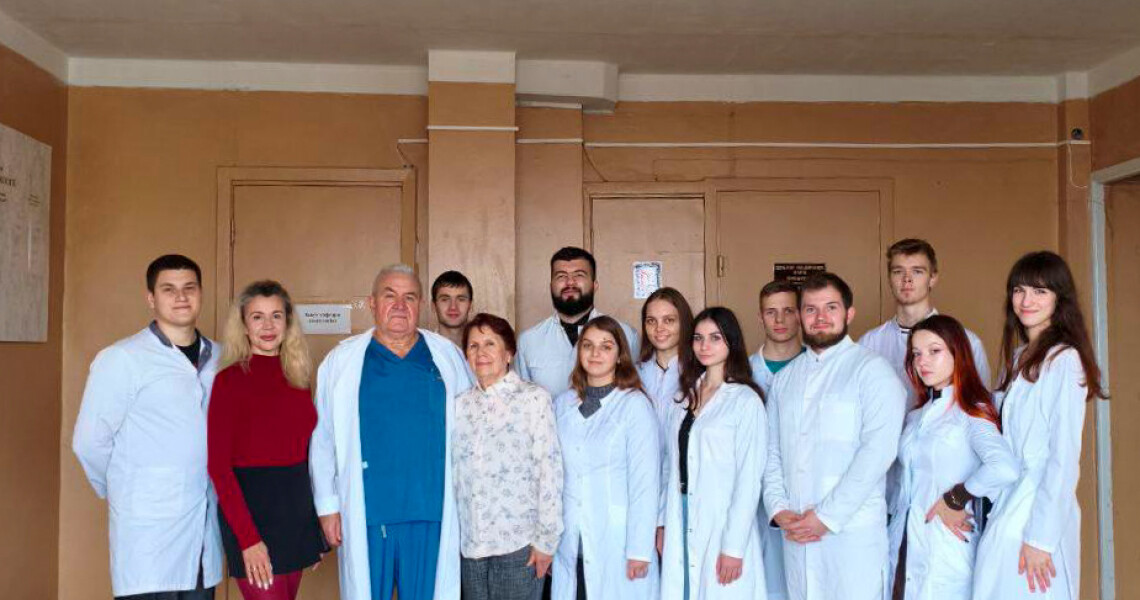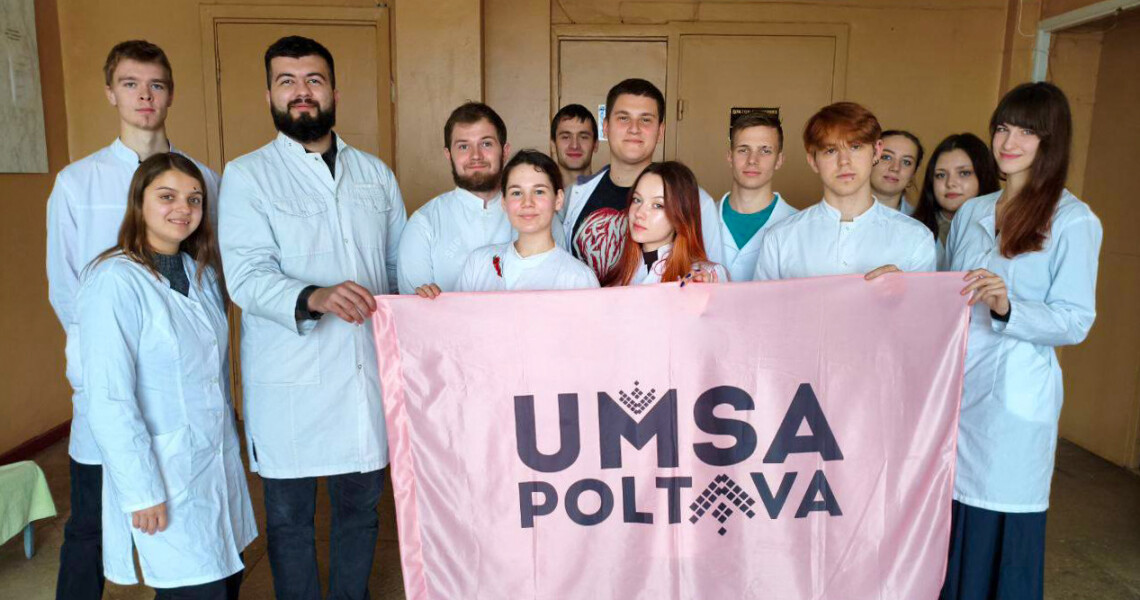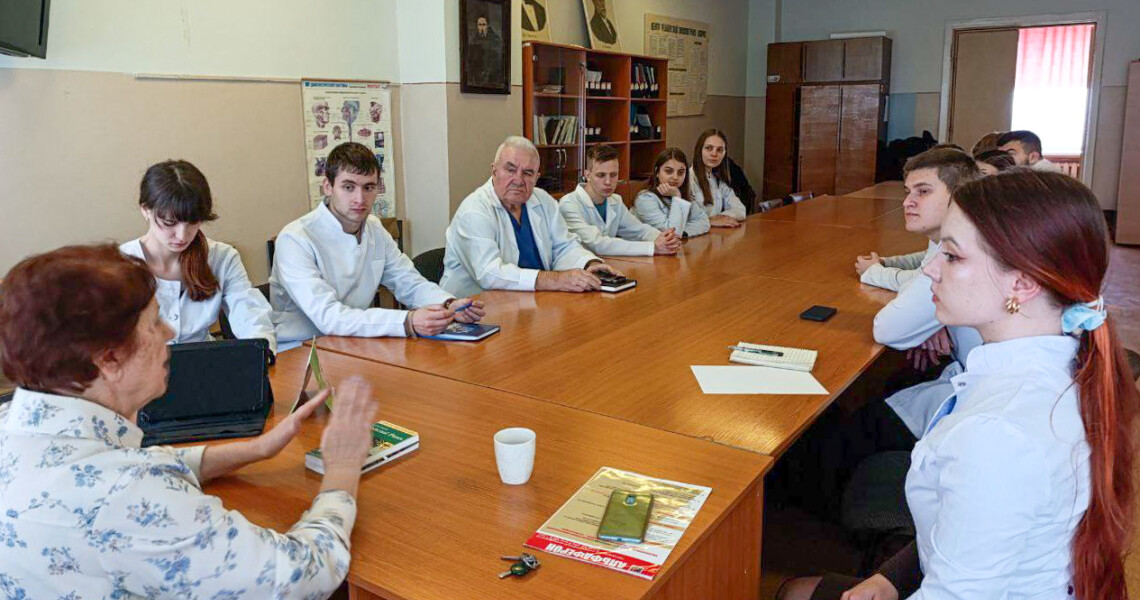До Міжнародного дня радіології, що відзначають 8 листопада, медична спільнота традиційно вшановує внесок фахівців, чиє щоденне служіння є критично важливим для діагностики, терапії та збереження життя пацієнтів. З цієї нагоди на кафедрі онкології та радіології з радіаційною медициною ПДМУ спільно з локальним осередком UMSA-Poltava Комітету медичної освіти відбувся тематичний освітній захід.
10 листопада 2025 року для студентів була проведена унікальна лекція, що поєднала історію, наукові напрацювання та практичний досвід роботи з постраждалими внаслідок Чорнобильської катастрофи. Лекторкою виступила доктор медичних наук, професорка Вікторія Почерняєва, яка значну частину свого професійного шляху присвятила допомозі людям, що зазнали радіаційного опромінення, та брала участь у розробці препаратів-радіопротекторів, одним із ключових компонентів яких була ехінацея.
Саме цій унікальній історії було присвячено лекцію з інтригуючою назвою:
«Як одна чарівна квітка врятувала нас від радіації?»
«Наш досвід роботи з постраждалими від Чорнобильської катастрофи змусив нас шукати рішення не лише у традиційній фармакології, а й у силі природи», — зазначила Вікторія Почерняєва.
Ця думка стала ключовим акцентом зустрічі, адже саме поєднання наукових підходів із природними ресурсами лягло в основу створення ефективних радіопротекторів — рішень, які й сьогодні залишаються важливими для медицини та безпеки.
Захід став для студентів нагадуванням про необхідність інтеграції міждисциплінарних знань і про те, що навіть у найскладніших умовах наука здатна знаходити несподівані, але дієві відповіді на виклики часу.
Своїми враженнями поділилася студентка 4 курсу медичного факультету №1 Радміла Чумакова:
«Лекція була надзвичайно насиченою інформацією про радіопротектори і досвід нашої лекторки — це беззаперечний привід для гордості, що така людина є в нашому університеті. Але найбільше мене вразило те, наскільки ця тема перегукується з нашим сьогоденням. В умовах повномасштабної війни, коли в повітрі відчувається напруга, пов’язана з потенційними ядерними ризиками, знання з радіаційної медицини стають питанням національної безпеки. Досвід Чорнобиля — це не просто історія, це готовий протокол дій, який, сподіваюся, нам ніколи не знадобиться. Але саме тому ми, студенти-медики, повинні не лише знати, а й глибоко розуміти всі аспекти радіаційної безпеки — від механізмів клітинного ушкодження до сучасних методів деконтамінації та реабілітації»
Маргарита Степанова, староста СНГ кафедри, студентка 4 курсу медичного факультету №1:
«Лекція була цікавою та багатогранною. Через досвід Вікторії Почерняєвої ми зрозуміли, як діяти студентам-медикам і людям загалом, а також помітили, що природа століттями створює ліки, які ми часто ігноруємо».
Захід, проведений до Міжнародного дня радіології, став важливою подією для університетської спільноти — можливістю поглянути на радіологію через призму історичного досвіду, сучасних викликів та професійної відповідальності майбутніх лікарів.
Прес-служба Полтавського державного медичного університету
Event for the International Day of Radiology at the University: The Chernobyl Experience and Radiation Medicine
To mark the International Day of Radiology, celebrated annually on November 8, the medical community traditionally honors the contributions of specialists whose daily service is vital for diagnostics, therapy, and saving patients’ lives. On this occasion, the Department of Oncology and Radiology with Radiation Medicine at PSMU, together with the UMSA-Poltava local branch of the Medical Education Committee, held a thematic educational event.
On November 10, 2025, students attended a unique lecture that combined history, scientific developments, and practical experience working with individuals affected by the Chernobyl disaster. The lecturer, Doctor of Medical Sciences, Professor Viktoriia Pocherniaieva, has dedicated a significant part of her professional career to helping people exposed to radiation and participated in the development of radioprotective drugs, one of the key components of which was echinacea.
This unique story became the focus of the lecture, delivered under the intriguing title:
“How One Magical Flower Saved Us from Radiation?”
“Our experience working with those affected by the Chernobyl catastrophe compelled us to seek solutions not only in traditional pharmacology but also in the power of nature,” noted Viktoriia Pocherniaieva.
This idea became the central theme of the meeting, as the combination of scientific approaches with natural resources formed the basis for creating effective radioprotectors — solutions that remain important for medicine and safety today.
The event served as a reminder to students about the need for integrating interdisciplinary knowledge and about the fact that even in the most challenging circumstances, science can find unexpected yet effective answers to contemporary challenges.
Fourth-year student of Medical Faculty No. 1, Radmila Chumakova, shared her impressions:
“The lecture was incredibly informative regarding radioprotectors, and the experience of our lecturer is undeniably a reason for pride — it is an honor to have such a person at our university. But what struck me most was how relevant this topic is to our present. In the context of full-scale war, when the tension associated with potential nuclear risks is palpable, knowledge of radiation medicine becomes a matter of national security. The experience of Chernobyl is not just history — it is a ready-made protocol of action that, I hope, we will never need. Yet this is exactly why we, as medical students, must not only know but deeply understand all aspects of radiation safety — from mechanisms of cellular damage to modern methods of decontamination and rehabilitation.”
Another fourth-year student of Medical Faculty No. 1 and head of the department’s Student Scientific Group, Margarita Stepanova, added:
“The lecture was interesting and multifaceted. Through the experience of Viktoriia Pocherniaieva, we understood how medical students — and people in general — should act, and we also realized that nature has been creating medicines for centuries, which we often overlook.”
The event held for the International Day of Radiology became an important occasion for the university community — an opportunity to view radiology through the lens of historical experience, current challenges, and the professional responsibility of future doctors.








